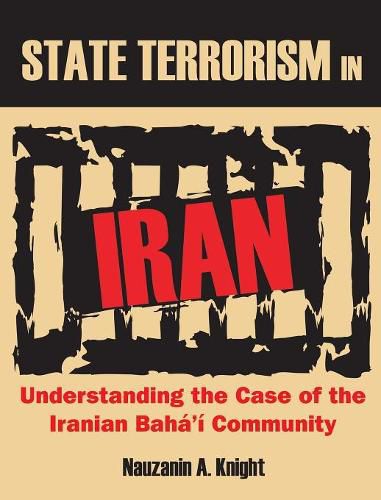Readings Newsletter
Become a Readings Member to make your shopping experience even easier.
Sign in or sign up for free!
You’re not far away from qualifying for FREE standard shipping within Australia
You’ve qualified for FREE standard shipping within Australia
The cart is loading…






This title is printed to order. This book may have been self-published. If so, we cannot guarantee the quality of the content. In the main most books will have gone through the editing process however some may not. We therefore suggest that you be aware of this before ordering this book. If in doubt check either the author or publisher’s details as we are unable to accept any returns unless they are faulty. Please contact us if you have any questions.
State terrorism, as a concept, has largely been operationalised out of terrorism literature. When a state uses violence systematically against unarmed victims, with the purpose of generating fear and communicating a message to a group beyond the immediate victims, this steps outside the bounds of legitimate use of violence. The Islamic Republic of Iran (IRI) has engaged in such acts of violence against the Baha'i community in that country. In this study, a working model of state terrorism is devised and the following central research question is addressed: do the strategy and tactics utilized by the IRI and/or its proxies against Iranian Baha'is constitute state terrorism? This qualitative study adopts a Mixed Approach Design. Eighteen Iranian Baha'i and non-Baha'i emigrants were purposively sampled and interviewed. In-depth interview data was triangulated and validated using structured data sources. Data analysis drew on the systematic-combining approach (Dubois & Gadde, 2002) whereby the original theoretical frame weighed against emergent findings. This exploratory study produces empirical evidence to suggest that Iran is a terrorist state: Iranian Baha'is are subjected to acts and/or threats of violence stemming from the state or its surrogates; the responsibility to protect norm is not applied to Baha'is; and, the IRI tries to invoke fear in and beyond the Iranian population to isolate and silence Baha'is. State terrorism claims many more victims than insurgent terrorism, yet the former concept is seldom mentioned in terrorism studies (Stohl, 2008). The onus is on researchers to identify cases of state terrorists and hold the perpetrators to account at the international level. A special case can be made, based on the empirical evidence, for the creation of an international convention on state terrorism that would hold state governments, like the IRI, responsible for carrying out terroristic acts of violence against segments of their population.
$9.00 standard shipping within Australia
FREE standard shipping within Australia for orders over $100.00
Express & International shipping calculated at checkout
This title is printed to order. This book may have been self-published. If so, we cannot guarantee the quality of the content. In the main most books will have gone through the editing process however some may not. We therefore suggest that you be aware of this before ordering this book. If in doubt check either the author or publisher’s details as we are unable to accept any returns unless they are faulty. Please contact us if you have any questions.
State terrorism, as a concept, has largely been operationalised out of terrorism literature. When a state uses violence systematically against unarmed victims, with the purpose of generating fear and communicating a message to a group beyond the immediate victims, this steps outside the bounds of legitimate use of violence. The Islamic Republic of Iran (IRI) has engaged in such acts of violence against the Baha'i community in that country. In this study, a working model of state terrorism is devised and the following central research question is addressed: do the strategy and tactics utilized by the IRI and/or its proxies against Iranian Baha'is constitute state terrorism? This qualitative study adopts a Mixed Approach Design. Eighteen Iranian Baha'i and non-Baha'i emigrants were purposively sampled and interviewed. In-depth interview data was triangulated and validated using structured data sources. Data analysis drew on the systematic-combining approach (Dubois & Gadde, 2002) whereby the original theoretical frame weighed against emergent findings. This exploratory study produces empirical evidence to suggest that Iran is a terrorist state: Iranian Baha'is are subjected to acts and/or threats of violence stemming from the state or its surrogates; the responsibility to protect norm is not applied to Baha'is; and, the IRI tries to invoke fear in and beyond the Iranian population to isolate and silence Baha'is. State terrorism claims many more victims than insurgent terrorism, yet the former concept is seldom mentioned in terrorism studies (Stohl, 2008). The onus is on researchers to identify cases of state terrorists and hold the perpetrators to account at the international level. A special case can be made, based on the empirical evidence, for the creation of an international convention on state terrorism that would hold state governments, like the IRI, responsible for carrying out terroristic acts of violence against segments of their population.